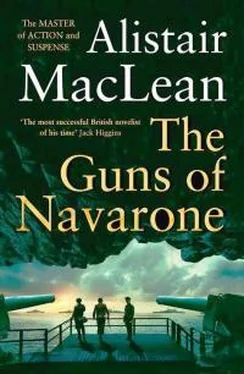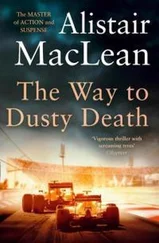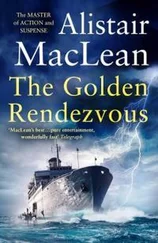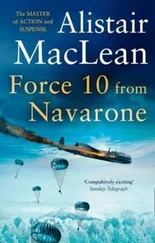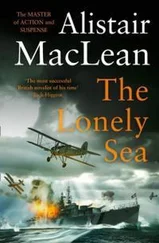Mallory picked up Panayis’s coat and examined it briefly. ‘He has.’
‘That’s it, then.’ Miller lit another cigarette, watched the match burn down slowly to his fingers, then looked up at Panayis. ‘How does it feel to know that you’re goin’ to die, Panayis, to feel like all them poor bastards who’ve felt just as you’re feeling now, just before they died – all the men in Crete, all the guys in the sea-borne and air landings on Navarone who died because they thought you were on their side? How does it feel, Panayis?’
Panayis said nothing. His left hand clutching his torn right arm, trying to stem the blood, he stood there motionless, the dark, evil face masked in hate, the lips still drawn back in that less than human snarl. There was no fear in him, none at all, and Mallory tensed himself for the last, despairing attempt for life that Panayis must surely make, and then he had looked at Miller and knew there would be no attempt, because there was a strange sureness and inevitability about the American, an utter immobility of hand and eye that somehow precluded even the thought, far less the possibility, of escape.
‘The prisoner has nothin’ to say.’ Miller sounded very tired. ‘I suppose I should say somethin’. I suppose I should give out with a long spiel about me bein’ the judge, the jury and the executioner, but I don’t think I’ll bother myself. Dead men make poor witnesses . . . Mebbe it’s not your fault, Panayis, mebbe there’s an awful good reason why you came to be what you are. Gawd only knows. I don’t, and I don’t much care. There are too many dead men. I’m goin’ to kill you, Panayis, and I’m goin’ to kill you now.’ Miller dropped his cigarette, ground it into the floor of the hut. ‘Nothin’ at all to say?’
And he had nothing at all to say, the hate, the malignity of the black eyes said it all for him and Miller nodded, just once, as if in secret understanding. Carefully, accurately, he shot Panayis through the heart, twice, blew out the candles, turned his back and was half-way towards the door before the dead man had crashed to the ground.
• • •
‘I am afraid I cannot do it, Andrea.’ Louki sat back wearily, shook his head in despair. ‘I am very sorry, Andrea. The knots are too tight.’
‘No matter.’ Andrea rolled over from his side to a sitting position, tried to ease his tightly-bound legs and wrists. ‘They are cunning, these Germans, and wet cords can only be cut.’ Characteristically, he made no mention of the fact that only a couple of minutes previously he had twisted round to reach the cords on Louki’s wrist and undone them with half a dozen tugs of his steel-trap fingers. ‘We will think of something else.’
He looked away from Louki, glanced across the room in the faint light of the smoking oil-lamp that stood by the grille door, a light so yellow, so dim that Casey Brown, trussed like a barnyard fowl and loosely secured, like himself, by a length of rope to the iron hooks suspended from the roof, was no more than a shapeless blur in the opposite corner of the stone-flagged room. Andrea smiled to himself, without mirth. Taken prisoner again, and for the second time that day – and with the same ease and surprise that gave no chance at all of resistance: completely unsuspecting, they had been captured in an upper room, seconds after Casey had finished talking to Cairo. The patrol had known exactly where to find them – and with their leader’s assurance that it was all over, with his gloating explanation of the part Panayis had played, the unexpectedness, the success of the coup was all too easy to understand. And it was difficult not to believe his assurance that neither Mallory nor Miller had a chance. But the thought of ultimate defeat never occurred to Andrea.
His gaze left Casey Brown, wandered round the room, took in what he could see of the stone walls and floor, the hooks, the ventilation ducts, the heavy grille door. A dungeon, a torture dungeon, one would have thought, but Andrea had seen such places before. A castle, they called this place, but it was really only an old keep, no more than a manor house built round the crenellated towers. And the long-dead Frankish nobles who had built these keeps had lived well. No dungeon this, Andrea knew, but simply the larder where they had hung their meat and game, and done without windows and light for the sake of . . .
The light! Andrea twisted round, looking at the smoking oil-lamp, his eyes narrowing.
‘Louki!’ he called softly. The little Greek turned round to look at him.
‘Can you reach the lamp?’
‘I think so . . . Yes, I can.’
‘Take the glass off,’ Andrea whispered. ‘Use a cloth – it will be hot. Then wrap it in the cloth, hit it on the floor – gently. The glass is thick – you can cut me loose in a minute or two.’
Louki stared at him for an uncomprehending moment, then nodded in understanding. He shuffled across the floor – his legs were still bound – reached out, then halted his hand abruptly, only inches from the glass. The peremptory, metallic clang had been only feet away, and he raised his head slowly to see what had caused it.
He could have stretched out his hand, touched the barrel of the Mauser that protruded threateningly through the bars of the grille door. Again the guard rattled the rifle angrily between the bars, shouted something he didn’t understand.
‘Leave it alone, Louki,’ Andrea said quietly. His voice was tranquil, unshadowed by disappointment. ‘Come back here. Our friend outside is not too pleased.’ Obediently Louki moved back, heard the guttural voice again, rapid and alarmed this time, the rattle as the guard withdrew his rifle quickly from the bars of the door, the urgent pounding of his feet on the flagstones outside as he raced up the passage.
‘What’s the matter with our little friend?’ Casey Brown was as lugubrious, as weary as ever. ‘He seems upset.’
‘He is upset.’ Andrea smiled. ‘He’s just realised that Louki’s hands are untied.’
‘Well, why doesn’t he tie them up again?’
‘Slow in the head he may be, but he is no fool,’ Andrea explained. ‘This could be a trap and he’s gone for his friends.’
Almost at once they heard a thud, like the closing of a distant door, the sound of more than one pair of feet running down the passage, the tinny rattling of keys on a ring, the rasp of a key against the lock, a sharp click, the squeal of rusty hinges and then two soldiers were in the room, dark and menacing with their jackboots and ready guns. Two or three seconds elapsed while they looked around them, accustoming their eyes to the gloom, then the man nearest the door spoke.
‘A terrible thing, boss, nothin’ short of deplorable! Leave ’em alone for a couple of minutes and see what happens? The whole damn bunch tied up like Houdini on an off night!’
There was a brief, incredulous silence, then all three were sitting upright, staring at them. Brown recovered first.
‘High time, too,’ he complained. ‘Thought you were never going to get here.’
‘What he means is that he thought we were never going to see you again,’ Andrea said quietly. ‘Neither did I. But here you are, safe and sound.’
‘Yes,’ Mallory nodded. ‘Thanks to Dusty and his nasty suspicious mind that cottoned on to Panayis while all the rest of us were asleep.’
‘Where is he?’ Louki asked.
‘Panayis?’ Miller waved a negligent hand. ‘We left him behind – he met with a sorta accident.’ He was across at the other side of the room now, carefully cutting the cords that pinioned Brown’s injured leg, whistling tunelessly as he sawed away with his sheath knife. Mallory, too, was busy, slicing through Andrea’s bonds, explaining rapidly what had happened, listening to the big Greek’s equally concise account of what had befallen the other in the keep. And then Andrea was on his feet, massaging his numbed hands, looking across at Miller.
Читать дальше
Конец ознакомительного отрывка
Купить книгу
